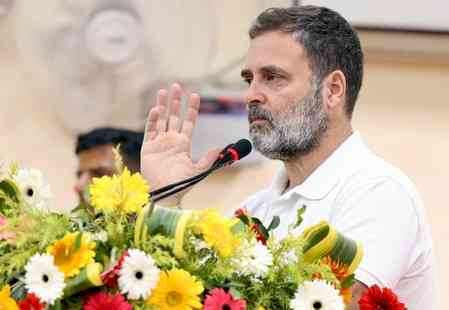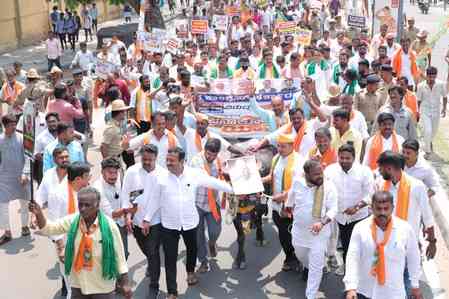Rising number of rejections don't bode well for RTI Act, CIC
As the RTI Act completes 17 years of being in the statute books, the legal right, which enabled common people to know about the acts of omission and commission by public functionaries, is facing a plethora of issues ranging from pendency of cases to rejection of applications.

New Delhi, July 10 (IANS) As the RTI Act completes 17 years of being in the statute books, the legal right, which enabled common people to know about the acts of omission and commission by public functionaries, is facing a plethora of issues ranging from pendency of cases to rejection of applications.
The RTI's journey, wherein it barely junked any pleas in its heyday to the spiralling backlog in the present times, also points at the functioning of the commissions set up under it, namely the Central Information Commission (CIC) and the State Information Commissions (SICs).
What is RTI Act?
The Constitution of India has enshrined the principles of democracy by guaranteeing to its citizens certain Fundamental Rights. Although the Right to Information is not included as a Fundamental Right in the Constitution, it protects the fundamental rights to Freedom of Expression and Speech under Article 19(1)(a) and the Right to Life and Personal Liberty under Article 21.
As per Section 2(j) of the RTI Act, 2005, Right to Information means the right of a citizen to seek any information accessible under this Act, which is held by or under control of any PA and includes the right to inspection of work, documents and records, which include any document, manuscript, and file and any electronic records and take notes, extracts, or certified copies of documents or records, take certified samples of material and obtain information as stored in form of diskettes, floppies, tapes, video cassettes, or any electronic mode or through printouts where such information is stored in a computer or in any other device.
What is Central Information Commission?
The Central Information Commission (CIC) is a statutory body, set up under the Right to Information Act in 2005 to act upon complaints from those who have not been able to submit information requests to a central public information officer or state public information officer.
The reason for this could be due to either the officer not having been appointed or because the respective central assistant public information officer or state assistant public information officer refused to receive the application for information under the RTI Act.
The commission includes one Chief Information Commissioner and not more than 10 information commissioners who are appointed by the President on the recommendation of a committee consisting of the Prime Minister as Chairperson, the Leader of Opposition in the Lok Sabha and a Union Cabinet Minister to be nominated by the PM.
Notable rejections of RTI
As per the Central Information Commission's annual report of 2020-21, the Ministry of Finance received 1,70,547 RTI requests and 17,252 of them -- 10.12 per cent of the applications -- were turned down.
The Ministry of Home Affairs got 59,286 applications, out of which 8,711, or 14.69 per cent, were rejected.
The Prime Minister's Office received 11,686 applications of which 609, nearly 5.21 per cent, were dismissed, where as the Ministry of External Affairs rejected 583 of its 10,811 applications, which is 5.39 per cent.
Recent legal battles on RTI
As per the latest court order on July 7, the Delhi High Court had stayed an order of the Central Information Commission directing the Income Tax (I-T) department to provide details on the tax exemption granted to the PM CARES fund in accordance with the RTI Act.
Earlier in January, the Delhi High Court had turned down a plea challenging the CIC order, which denied details of the Supreme Court collegium meeting held on December 12, 2018, in connection with the appointment of judges in the apex court.
The petition was challenging the CIC order which denied an RTI plea about the meeting which was not made public till then.
In another order pending from last year, the Delhi High Court has asked the CIC to decide within eight weeks on a plea against the refusal of an RTI application seeking information on electronic surveillance ordered under Section 69 of the Information Technology Act (IT Act).
According to the plea, in December 2018, petitioner Apar Gupta, the co-founder and executive director of Internet Freedom Foundation (IFF), filed six applications under the RTI Act seeking details of a number of orders passed under Section 69 of the IT Act between January 2016 and December 2018, granting permission for electronic surveillance.
The Central Public Information Office (CPIO) disposed of his request arguing that disclosure of information related to lawful interception/phone tapping/monitor or decrypt is exempted under the RTI.
It was submitted that the petitioner was denied his fundamental right to access information for nearly three years due to delay attributable entirely to the respondents.
In January, the high court had refused to stay an order of the CIC which allowed a petitioner to get to know the financial records and salaries of members and staff of Hockey India through the RTI Act.
Noting that Hockey India, a public authority, cannot shy away from disclosing such information, Justice Rekha Palli said even the salaries of judges are also known to everyone.
"Prima facie I really don't see what is wrong with the CIC order. You are a public authority, you can't shy away from disclosing the salaries of employees, no matter how high or low it is. When our salaries are known to everybody then what is the problem with the salaries of your employees. You are a public authority which is getting so much of aid, benefits, and funds," the court said.
--IANS
jw/arm


 IANS
IANS 








